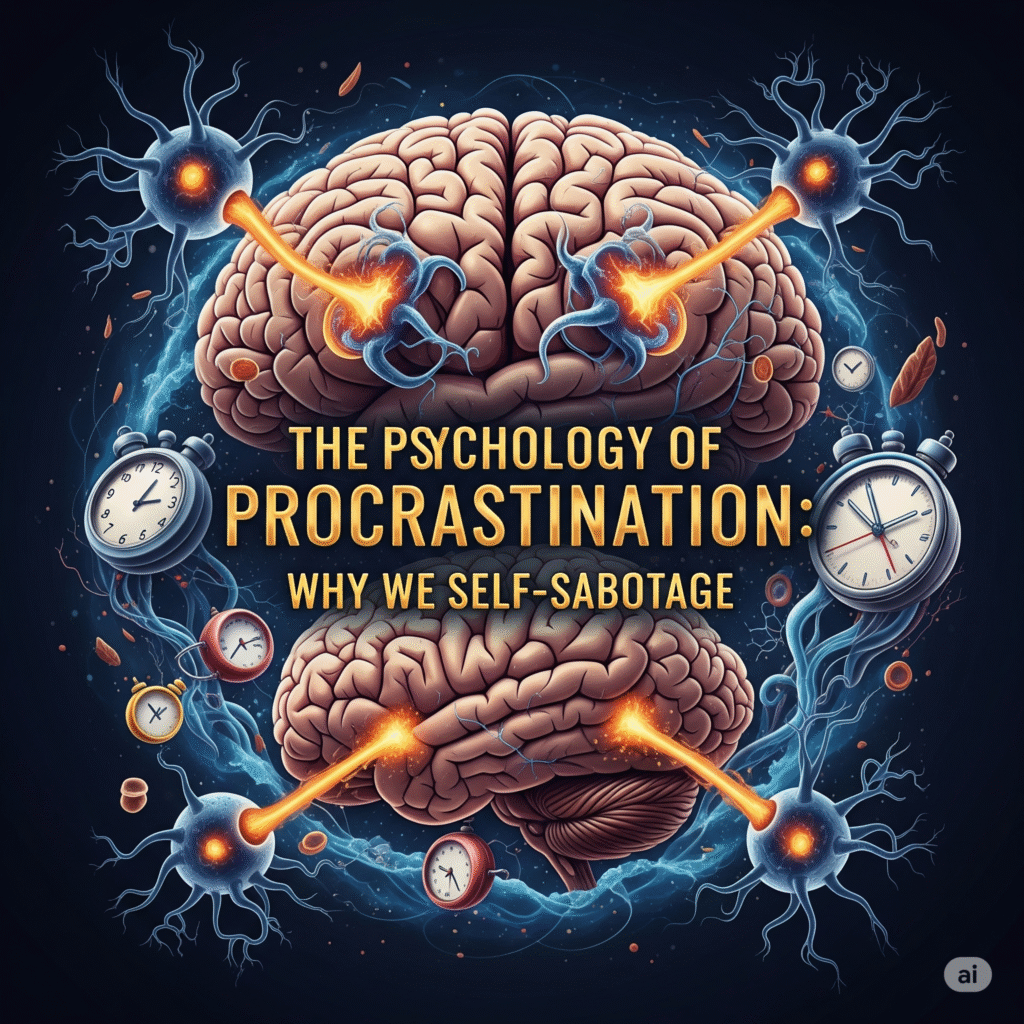Psychology of Procrastination
We’ve all done it—put off a task until the last minute, even when we knew better. Whether it’s delaying an assignment, skipping the gym, or ignoring that important email, procrastination is a habit that affects millions of people. But why do we do it? More importantly, why do we self-sabotage, even when we’re aware of the consequences?
Let’s dive into the psychology of procrastination to understand the deeper reasons behind this common behaviour—and what we can do to overcome it.
What Is Procrastination?
At its core, procrastination is the act of delaying or postponing tasks. It’s not just laziness or poor time management. In fact, many procrastinators are highly capable and even perfectionists. The problem isn’t that we don’t care—it’s that we care too much, and the emotional weight of the task becomes overwhelming.
Why Do We Procrastinate?
Several psychological factors drive procrastination. Here are some of the most common:
1. Fear of Failure
When we’re afraid we won’t succeed, we avoid trying altogether. This fear creates a mental block that paralyses us. Ironically, procrastination becomes a way to protect our self-esteem. If we don’t give our best effort, we can always blame the outcome on a “lack of time.”
2. Perfectionism
Perfectionists often procrastinate because they want every detail to be flawless. This desire for perfection makes starting a task feel daunting. Instead of risking imperfection, they delay the task, waiting for the “right” moment, which rarely comes.
3. Lack of Motivation
Let’s face it: some tasks just aren’t enjoyable. When we find something boring or meaningless, our brain struggles to engage. We seek immediate gratification instead, like scrolling social media or binge-watching shows.
4. Poor Emotional Regulation
Procrastination is often a coping mechanism. When we feel anxious, overwhelmed, or frustrated, we avoid the source of discomfort. In this way, procrastination serves as short-term mood relief, even if it leads to long-term stress.
The Science Behind Self-Sabotage
According to researchers, procrastination is deeply connected to the limbic system—the part of the brain responsible for emotions. When we perceive a task as stressful or unpleasant, the limbic system overpowers the prefrontal cortex, which handles planning and decision-making. In other words, our emotions hijack our logic.
This internal conflict leads to self-sabotage. We know the task is important, but our brain pushes us to avoid it. The result? Missed deadlines, decreased performance, and unnecessary stress.
How to Break the Cycle of Procrastination
Now that we understand the psychology behind procrastination, how can we overcome it? Here are some practical strategies:
1. Start Small
Instead of aiming to finish everything at once, break the task into small, manageable steps. Getting started is often the hardest part, so make it easy.
2. Set Clear Deadlines
Even if a task doesn’t have a strict deadline, create one for yourself. This gives your brain a sense of urgency and accountability.
3. Practice Self-Compassion
Beating yourself up for procrastinating only makes things worse. Acknowledge the behaviour without judgment, and focus on what you can do next.
4. Reward Progress
Celebrate small wins. Whether it’s ticking off a to-do list item or spending five focused minutes on a task, give yourself credit for taking action.
5. Eliminate Distractions
Create a focused environment. Turn off notifications, close unnecessary tabs, and set a timer to work in short, concentrated bursts (like the Pomodoro Technique).
Final Thoughts
Procrastination isn’t a personal flaw—it’s a psychological pattern rooted in our emotional responses. By understanding the underlying causes, we can begin to change our behaviour with intention and compassion.
The next time you feel tempted to delay something important, pause and ask yourself: What emotion am I avoiding? That moment of awareness can be the first step toward breaking free from self-sabotage and reclaiming your time.
📚 Further Reading & Trusted Sources
How to manage our time to improve our lives?
The Elusive Art of Discipline: Why We Struggle and How to Find Our Rhythm
🔥The Silent Power: How Women Ruled the Minds of Men in a Man’s World
🔥 Why the Feminine Is Worshipped and Feared: Unravelling the Gate of Hell Paradox
Harvard Business Review – The Real Reasons You Procrastinate


Pingback: The Rise of Digital Nomads: Is This the Future of Work?
Pingback: The Sedentary Lifestyle Epidemic: How Sitting Is Killing Us Slowly
Pingback: The Pursuit of Perfectionism: Why Good Enough Matters
Pingback: Losing Creativity in the Race for Perfection: How to Get It Back
Thank you for your sharing. I am worried that I lack creative ideas. It is your article that makes me full of hope. Thank you. But, I have a question, can you help me?